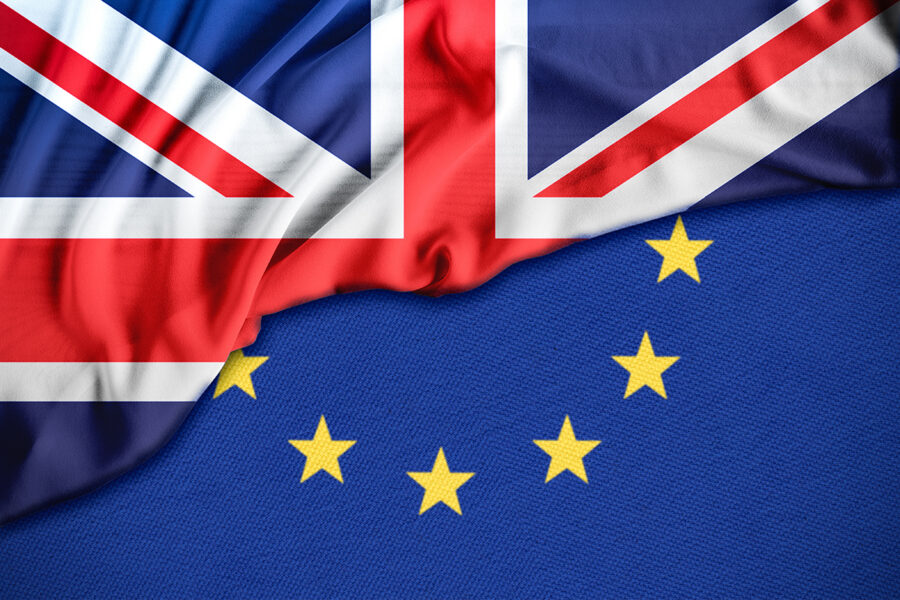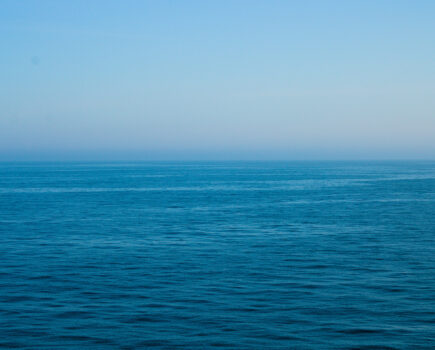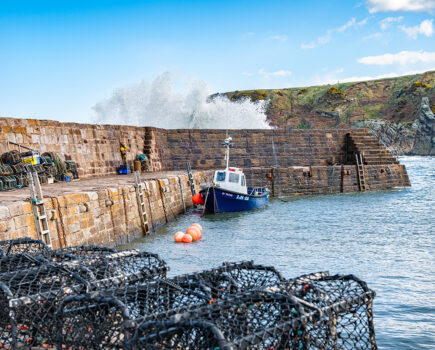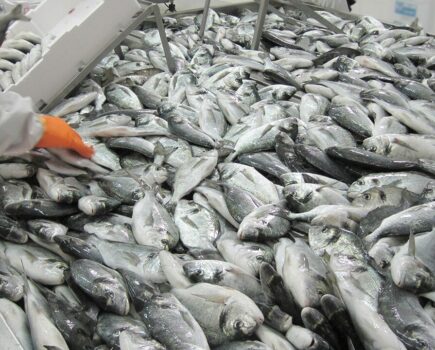Plans for new fisheries regime spelled out – White paper starts 10-week consultation
DEFRA has published its long-awaited fisheries white paper, setting out its plans for a new UK fisheries management regime when Brexit is completed
It sets out how the UK will seek to secure a fairer share of fishing opportunities and revitalise coastal communities, and puts marine protection at the heart of policy.
The white paper – ‘Sustainable Fisheries for Future Generations’ – outlines how powers to be proposed in the Fisheries Bill (to be introduced in this session of parliament) will give the UK full control of its waters, and the ability to set fishing opportunities such as quota.
It sets out how the UK will have the opportunity to move towards a fairer share of fishing opportunities – the current system, based on fishing patterns from the 1970s, allows EU member states to land around eight times as much fish in UK waters as the UK does in EU waters.
It also proposes a range of measures to improve the sustainability of the fishing industry, and to protect the marine environment.
Launching the white paper, Prime Minister Theresa May said: “As an island nation, our fishing industry is the lifeblood of coastal communities around the UK.
“I have been clear that when we leave the EU, we will take back control of our waters, while ensuring we don’t see our fishermen unfairly denied access to other waters.
“The plans set out today demonstrate the bright future in store, as we build the UK fishing industry for future generations, by putting the importance of a healthy marine environment at its heart.”
Environment secretary Michael Gove said: “Leaving the EU creates a sea of opportunity for our fishing industry. Outside the CFP, we can take back control of our waters and revitalise our coastal communities.
“Sitting at the heart of the white paper will be the UK government’s commitment to sustainable fisheries, including ending the wasteful discarding of fish”
“We will be able to put in place our own systems, becoming a world leader in managing our resources, while protecting the marine environment. We will work closely with everyone who has an interest in this important industry, to make the most of this historic opportunity.”
But the Scottish government said it was unhappy with the white paper, and that it had not been consulted on its contents (see below).
The white paper sets out a number of methods to explore fairer allocation of fishing opportunities, such as zonal attachment, which is based on distribution of fish stocks, rather than historical data.
“Sitting at the heart of the white paper will be the UK government’s commitment to sustainable fisheries, including ending the wasteful discarding of fish, and making clear that vessels will only be allowed to fish in our waters if they adhere to our high sustainability standards,” said DEFRA.
“It will also commit to publishing an annual statement, setting out the health of fish stocks and based on the latest scientific evidence. If stocks are struggling, the four UK fisheries administrations will work together to put in place a comprehensive recovery plan to restore them to healthy levels.
“Likewise, the paper will outline a new approach to tackling ‘choke species’.”
The white paper proposes two new approaches in England – a reserve of quota that could be used to offset choke species, and a new scheme to help fishermen who are unable to find quota to set against their catch.
The government will also pursue an ecosystem approach to fisheries management that will minimise impacts on non-commercial species and the marine environment. It will also ensure compliance with international obligations to manage the UK’s shared resources sustainably.
DEFRA said: “We do not yet know the outcome of the UK’s negotiations to withdraw from the EU, or on a future economic partnership, and the white paper is clear that market access for fisheries products is separate to the question of fishing opportunities and access to waters.
“Access to waters and fishing opportunities will be negotiated on an annual basis. This is consistent with the approach to fisheries taken by other coastal states, including Norway.”
The white paper can be accessed at: bit.ly/2Nnl9lP
Scots ‘deeply frustrated’ at lack of consultation
DEFRA claimed that the UK government’s approach will benefit the whole of the UK. “We will work with the devolved administrations to develop a new UK framework for fisheries management, which will maximise their power to manage their fisheries, while maintaining the overall coherence of the UK’s approach.”
But the Scottish government said it had not been fully consulted on the white paper, and said it had ‘significant concerns’ about some of its proposals.
Scottish fisheries secretary Fergus Ewing said: “It is deeply frustrating that, once again, the UK government has failed to substantively engage with us while developing its future fisheries proposals. This near lack of formal engagement presents a significant and continued risk to the current devolved settlements, and is totally unacceptable.
“We have significant concerns as to whether some of the proposals, such as charging for fish caught in excess of quota, are viable if we are to prevent overfishing and ensure sustainability. We are also deeply concerned that the paper does not appear to recognise the vital contribution that EMFF monies have to the sustainable growth and success of the industry.
“The paper completely ignores the critical importance of ongoing access to labour for the seafood processing sector and, while acknowledging seafood trade as ‘vital’, provides no detail whatsoever on how seafood exports will be protected from potentially damaging trade barriers.
“We can only conclude from this that political considerations and undeliverable promises are far more important to the UK government than the real needs of businesses and coastal communities, and economic reality.
“In addition, there are a number of areas where clarity is required – not least, where exactly it is being proposed as a UK approach, and where the proposals are for England only. As I have said repeatedly, there is not a UK fisheries policy, and to suggest so is misleading.
“There are legitimately different regimes for different regional fisheries, and fishing is fully devolved.
“Had the document been shared with us at an earlier stage, many of these issues might have been addressed through constructive engagement and dialogue. Unfortunately, by only sharing the final copy a matter of days before its publication, the UK government chose to significantly limit the scope for that.
“I have repeatedly signalled my willingness to engage on a range of EU exit issues in good faith. However, I will continue to resolutely oppose any attempt to interfere with the established powers of the Scottish parliament, the Scottish zone, or Scottish vessels, wherever they operate.”
Broad welcome from industry
Industry leaders welcomed the publication of the white paper, which starts a 10-week consultation process. NFFO chief executive Barrie Deas said the government had presented ‘a broad vision for post-Brexit fisheries that is clear and cogent – and importantly, is aligned with international law’.
“I am sure that it will attract wide support across the industry and parliament,” he said.
“Outside the EU, the UK will be an independent coastal state, and this will provide the basis to rebalance quota shares and implement effective and adaptive management measures for our fisheries.
“We are pleased a partnership with the fishing industry is at the heart of the government’s approach. There is much to do, and we look forward to working within this framework of cooperation.”
SFF chief executive Bertie Armstrong said: “The white paper enshrines the important elements that we have been arguing for, to forge a sustainable future for our industry – allowing the UK to become an independent coastal state, to take charge of who catches what, where, and to resist any and all attempts to link access to our waters to access to EU markets.
“Of course, there is a long way to go, and we now need our governments to show real backbone in the Brexit negotiations, to ensure that these aspirations become reality.”
Jim Portus, chief executive of the South Western FPO, said the launch of the fisheries white paper had been ‘eagerly awaited and is welcomed by all in the UK fishing industry’.
“Many promises have been made since well before the referendum two years ago. The white paper sets out the government rationale for delivering on those promises.”
He said that the SWFPO would ‘study the text carefully and respond fully in due course’. “It is certain that we will focus as much on what is not in the white paper as on its contents,” he added.
Pointing out that the market for SWFPO members’ fish products is primarily in Europe, Jim Portus said, “We will be looking at other aspects of government policy, to ensure that our members continue to derive profitability from the valuable trade of their catches.”








